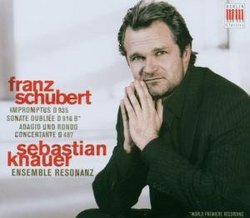| All Artists: Franz [Vienna] Schubert, Sebastian Knauer Title: Franz Schubert: Impromptus D935; Sonate Oubliée D916B; Adagio und Rondo Concertante D487 Members Wishing: 0 Total Copies: 0 Label: Berlin Classics Original Release Date: 1/1/2007 Re-Release Date: 8/21/2007 Genre: Classical Styles: Chamber Music, Forms & Genres, Sonatas, Historical Periods, Classical (c.1770-1830), Romantic (c.1820-1910) Number of Discs: 1 SwapaCD Credits: 1 UPC: 782124161620 |
Search - Franz [Vienna] Schubert, Sebastian Knauer :: Franz Schubert: Impromptus D935; Sonate Oubliée D916B; Adagio und Rondo Concertante D487
 | Franz [Vienna] Schubert, Sebastian Knauer Franz Schubert: Impromptus D935; Sonate Oubliée D916B; Adagio und Rondo Concertante D487 Genre: Classical |
Larger Image |
CD Details |
CD ReviewsCalling All Schubertians Johannes Climacus | Beverly, Massachusetts | 04/22/2008 (5 out of 5 stars) "Sebastian Knauer (a relatively young pianist with an enviable pedigree) provides an extraordinarily varied and interesting program, the centerpiece of which is a reconstructed sonata D. 916B that every Schubertian should hear forthwith. Roland Sölder and Jörg Demus have done everyone a benefaction by completing Schubert's sketches for what would have surely been one of his grandest works for piano (and which, even as reconstructed, provides a glorous 24 minutes of fully mature Schubert). Veteran Schubertians will instantly recognize the opening theme of the first movement as that which the composer took up again at the very end of his life for the beginning of the similarly fragmentary Tenth Symphony (though in that work's first movement the theme in question embarks on very different adventures).
To hear a realization of this "Sonata Oubliée" would be sufficient incentive for many listeners to purchase this release regardless of performance values. But, in the event, Sebastian Knauer gives of his best. The Impromptus D. 935 are played with formidable virtuosity and gorgeous tone. The intellectual rigor is on the order of Alfred Brendel, but the sound Knauer coaxes from the instrument is far more pleasing than Brendel's characteristic brittleness. The Sonata Oubliée follows and is given a similarly cogent treatment, utterly belying any impression that this is not a standard repertory piece that Knauer has been playing for years! Again, effortless virtuosity combines with extraordinary insight into Schubert's chimerical mood-swings. The "Hungarian" finale, in particular, fairly bristles with pugnacious energy--where it is not given over to melting lyricism. Knauer projects the ambiguous pathos of this movement most sympathetically. The program concludes with "Adagio and Rondo Concertante" D. 487. Another rarity, this is the closest Schubert ever came to writing a piano concerto. Originally scored for string quartet and piano, it is heard here in an arrangement for string orchestra, the justification for which is undoubtedly that, in this guise, we can more fully grasp the piano concerto "that might have been." It is a charming work, though I'm not sure the inflated textures created by a chamber orchestra do it any favors. It might have been more interesting to give it full orchestral treatment--winds, and maybe brass included--so as to provide a more convincing realization of this work's concertante style. In any case, Knauer plays this Weberian confection with the superb musicianship and effortless sense of style that graced his performances of the solo works on this recording. The sound is crisp, clear and ample, projecting the sonorities of Knauer's instrument with astonishing realism. This is a recital not to be missed by dedicated Schubertians and conoisseurs of superb pianism! Let us hope Knauer records more Schubert (including more fragments and rarities). Strongest recommendation." |
